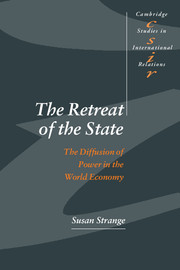Book contents
- Frontmatter
- Contents
- Preface
- Part I Theoretical foundations
- Part II Some empirical evidence
- 6 Authority beyond the state
- 7 Telecoms: the control of communication
- 8 Organised crime: the mafias
- 9 Insurance business: the risk managers
- 10 The Big Six accountants
- 11 Cartels and private protectionism
- 12 International organisations: the econocrats
- Part III Conclusions
- References
- Index
- CAMBRIDGE STUDIES IN INTERNATIONAL RELATIONS
7 - Telecoms: the control of communication
from Part II - Some empirical evidence
Published online by Cambridge University Press: 07 October 2009
- Frontmatter
- Contents
- Preface
- Part I Theoretical foundations
- Part II Some empirical evidence
- 6 Authority beyond the state
- 7 Telecoms: the control of communication
- 8 Organised crime: the mafias
- 9 Insurance business: the risk managers
- 10 The Big Six accountants
- 11 Cartels and private protectionism
- 12 International organisations: the econocrats
- Part III Conclusions
- References
- Index
- CAMBRIDGE STUDIES IN INTERNATIONAL RELATIONS
Summary
A classic, extreme example of one process by which authority has shifted massively away from the governments of states to the corporate management of firms is to be found in telecommunications. At the peak of their power over society, states claimed, and exercised, the right to control the substance of information – by censorship, for example, of books or the press – and to control the means by which information was communicated – post, telegraph and telephone. In the last decade or so, a rapid decline in this power has set in, set off by a combination of technological change, demand in the market and policy changes in the United States driven by economic interests but legitimised by the economic ideology of private enterprise.
The result of the shift has been to narrow the options open to supposedly sovereign states, and to extend the opportunities – and risks – of those enterprises engaged in the supply of services and of the hardware by which the services are offered on the market. Another result has been to concentrate authority over this economic infrastructure in the governments and firms of the developed countries, and especially in those of the United States. Other governments have been forced by a combination of technological and economic change to give up their exclusive control for the sake of maintaining the competitiveness in world markets of the national economies for whose welfare they are held responsible.
- Type
- Chapter
- Information
- The Retreat of the StateThe Diffusion of Power in the World Economy, pp. 100 - 109Publisher: Cambridge University PressPrint publication year: 1996



